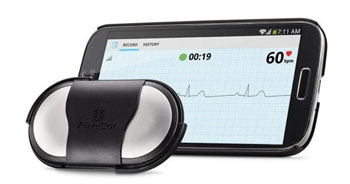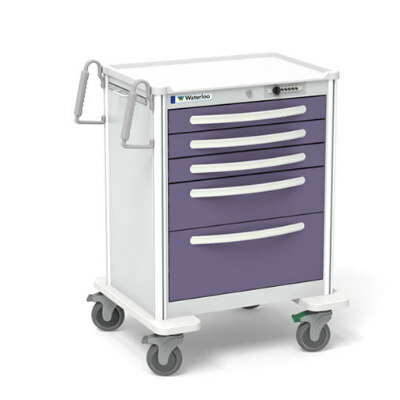Medical-Grade Mobile App Manages Stroke Risk Factors
|
By Daniel Beris Posted on 29 Nov 2016 |

Image: The AliveCor mobile ECG recorder (Photo courtesy of AliveCor).
A novel Smartphone app combines electrocardiogram (ECG), body weight, and blood pressure data to improve overall heart health and lower the risk of cardiovascular disease (CVD).
The result of a collaboration between AliveCor (San Francisco, CA, USA) and the Mayo Clinic (Rochester, MN, USA), the new app, which is available for both Apple iOS and Android platforms, enables users to capture five of the most important factors for evaluating CVD risk: heart rhythm, blood pressure, weight, physical activity, and resting heart rate. Enabling users to view the results provides them with an overall picture of their own health and helps them share readings with loved ones.
The app combines AliveCor's Kardia app measurements with manually entered weight, together with other data collected by various activity apps. In the case of IOS, users can access Apple Health or Google Fit; Android users can manually enter their blood pressure results and access their readings from Google Fit. In both cases, the indicators have the potential to not only improve heart health but also overall health care for a variety of conditions.
“Mayo Clinic has pioneered new approaches that may uncover significant measures of physiology that have been hidden in individuals' ECGs,” said Vic Gundotra, CEO of AliveCor. “With these new integrations, AliveCor is expanding beyond just atrial fibrillation detection and giving patients more control over their own care. This combination of vital stats gives patients an unprecedented view of their heart disease risk factors, making them more engaged in their heart health care.”
By using AliveCor's deep machine learning capabilities, as applied to over 10 million user ECG recordings of patients at the Mayo Clinic, the two companies will work together to uncover hidden physiological signals to improve heart and overall human health. For example, the health indicators that are uncovered may have implications for patients who are at risk from marked changes in blood potassium levels, such as those with kidney failure.
“Dangerously abnormal potassium levels can impact the morphology of an ECG. The ECG can be used to quantify serum potassium as a significant enhancement to traditional morphology analysis,” said Paul Friedman, MD, a Mayo clinic cardiologist who helped develop the intellectual property that went into the technology. “It is exciting to see the application of machine learning algorithms in ECG and its potential to quickly detect rhythm abnormalities in patients.”
Related Links:
AliveCor
Mayo Clinic
The result of a collaboration between AliveCor (San Francisco, CA, USA) and the Mayo Clinic (Rochester, MN, USA), the new app, which is available for both Apple iOS and Android platforms, enables users to capture five of the most important factors for evaluating CVD risk: heart rhythm, blood pressure, weight, physical activity, and resting heart rate. Enabling users to view the results provides them with an overall picture of their own health and helps them share readings with loved ones.
The app combines AliveCor's Kardia app measurements with manually entered weight, together with other data collected by various activity apps. In the case of IOS, users can access Apple Health or Google Fit; Android users can manually enter their blood pressure results and access their readings from Google Fit. In both cases, the indicators have the potential to not only improve heart health but also overall health care for a variety of conditions.
“Mayo Clinic has pioneered new approaches that may uncover significant measures of physiology that have been hidden in individuals' ECGs,” said Vic Gundotra, CEO of AliveCor. “With these new integrations, AliveCor is expanding beyond just atrial fibrillation detection and giving patients more control over their own care. This combination of vital stats gives patients an unprecedented view of their heart disease risk factors, making them more engaged in their heart health care.”
By using AliveCor's deep machine learning capabilities, as applied to over 10 million user ECG recordings of patients at the Mayo Clinic, the two companies will work together to uncover hidden physiological signals to improve heart and overall human health. For example, the health indicators that are uncovered may have implications for patients who are at risk from marked changes in blood potassium levels, such as those with kidney failure.
“Dangerously abnormal potassium levels can impact the morphology of an ECG. The ECG can be used to quantify serum potassium as a significant enhancement to traditional morphology analysis,” said Paul Friedman, MD, a Mayo clinic cardiologist who helped develop the intellectual property that went into the technology. “It is exciting to see the application of machine learning algorithms in ECG and its potential to quickly detect rhythm abnormalities in patients.”
Related Links:
AliveCor
Mayo Clinic
Latest Health IT News
- Machine Learning Model Improves Mortality Risk Prediction for Cardiac Surgery Patients
- Strategic Collaboration to Develop and Integrate Generative AI into Healthcare
- AI-Enabled Operating Rooms Solution Helps Hospitals Maximize Utilization and Unlock Capacity
- AI Predicts Pancreatic Cancer Three Years before Diagnosis from Patients’ Medical Records
- First Fully Autonomous Generative AI Personalized Medical Authorizations System Reduces Care Delay
- Electronic Health Records May Be Key to Improving Patient Care, Study Finds
- AI Trained for Specific Vocal Biomarkers Could Accurately Predict Coronary Artery Disease
- First-Ever AI Test for Early Diagnosis of Alzheimer’s to Be Expanded to Diagnosis of Parkinson’s Disease
- New Self-Learning AI-Based Algorithm Reads Electrocardiograms to Spot Unseen Signs of Heart Failure
- Autonomous Robot Performs COVID-19 Nasal Swab Tests

- Statistical Tool Predicts COVID-19 Peaks Worldwide
- Wireless-Controlled Soft Neural Implant Stimulates Brain Cells
- Tiny Polymer Stent Could Treat Pediatric Urethral Strictures
- Human Torso Simulator Helps Design Brace Innovations
- 3D Bioprinting Rebuilds the Human Heart
Channels
Artificial Intelligence
view channel
AI-Powered Algorithm to Revolutionize Detection of Atrial Fibrillation
Atrial fibrillation (AFib), a condition characterized by an irregular and often rapid heart rate, is linked to increased risks of stroke and heart failure. This is because the irregular heartbeat in AFib... Read more
AI Diagnostic Tool Accurately Detects Valvular Disorders Often Missed by Doctors
Doctors generally use stethoscopes to listen for the characteristic lub-dub sounds made by heart valves opening and closing. They also listen for less prominent sounds that indicate problems with these valves.... Read moreCritical Care
view channel
Stretchable Microneedles to Help In Accurate Tracking of Abnormalities and Identifying Rapid Treatment
The field of personalized medicine is transforming rapidly, with advancements like wearable devices and home testing kits making it increasingly easy to monitor a wide range of health metrics, from heart... Read more
Machine Learning Tool Identifies Rare, Undiagnosed Immune Disorders from Patient EHRs
Patients suffering from rare diseases often endure extensive delays in receiving accurate diagnoses and treatments, which can lead to unnecessary tests, worsening health, psychological strain, and significant... Read more
On-Skin Wearable Bioelectronic Device Paves Way for Intelligent Implants
A team of researchers at the University of Missouri (Columbia, MO, USA) has achieved a milestone in developing a state-of-the-art on-skin wearable bioelectronic device. This development comes from a lab... Read more
First-Of-Its-Kind Dissolvable Stent to Improve Outcomes for Patients with Severe PAD
Peripheral artery disease (PAD) affects millions and presents serious health risks, particularly its severe form, chronic limb-threatening ischemia (CLTI). CLTI develops when arteries are blocked by plaque,... Read moreSurgical Techniques
view channelHandheld Device for Fluorescence-Guided Surgery a Game Changer for Removal of High-Grade Glioma Brain Tumors
Grade III or IV gliomas are among the most common and deadly brain tumors, with around 20,000 cases annually in the U.S. and 1.2 million globally. These tumors are very aggressive and tend to infiltrate... Read more.jpg)
Cutting-Edge Robotic Bronchial Endoscopic System Provides Prompt Intervention during Emergencies
A novel robotic bronchial endoscopic system has been developed to minimize side effects and provide timely intervention for airway obstructions caused by food or foreign bodies in infants, young children,... Read morePatient Care
view channelFirst-Of-Its-Kind Portable Germicidal Light Technology Disinfects High-Touch Clinical Surfaces in Seconds
Reducing healthcare-acquired infections (HAIs) remains a pressing issue within global healthcare systems. In the United States alone, 1.7 million patients contract HAIs annually, leading to approximately... Read more
Surgical Capacity Optimization Solution Helps Hospitals Boost OR Utilization
An innovative solution has the capability to transform surgical capacity utilization by targeting the root cause of surgical block time inefficiencies. Fujitsu Limited’s (Tokyo, Japan) Surgical Capacity... Read more
Game-Changing Innovation in Surgical Instrument Sterilization Significantly Improves OR Throughput
A groundbreaking innovation enables hospitals to significantly improve instrument processing time and throughput in operating rooms (ORs) and sterile processing departments. Turbett Surgical, Inc.... Read morePoint of Care
view channel
Critical Bleeding Management System to Help Hospitals Further Standardize Viscoelastic Testing
Surgical procedures are often accompanied by significant blood loss and the subsequent high likelihood of the need for allogeneic blood transfusions. These transfusions, while critical, are linked to various... Read more
Point of Care HIV Test Enables Early Infection Diagnosis for Infants
Early diagnosis and initiation of treatment are crucial for the survival of infants infected with HIV (human immunodeficiency virus). Without treatment, approximately 50% of infants who acquire HIV during... Read more
Whole Blood Rapid Test Aids Assessment of Concussion at Patient's Bedside
In the United States annually, approximately five million individuals seek emergency department care for traumatic brain injuries (TBIs), yet over half of those suspecting a concussion may never get it checked.... Read more
New Generation Glucose Hospital Meter System Ensures Accurate, Interference-Free and Safe Use
A new generation glucose hospital meter system now comes with several features that make hospital glucose testing easier and more secure while continuing to offer accuracy, freedom from interference, and... Read moreBusiness
view channel
Johnson & Johnson Acquires Cardiovascular Medical Device Company Shockwave Medical
Johnson & Johnson (New Brunswick, N.J., USA) and Shockwave Medical (Santa Clara, CA, USA) have entered into a definitive agreement under which Johnson & Johnson will acquire all of Shockwave’s... Read more

















